Foundation in maritime training
Whether you want a tailor-made solution or an off-the-shelf course, our long-standing key partnerships and unique state-of-the-art infrastructure allow us to develop program packages and courses for your specific needs.
The campus and key people have been operational since 2002 in Subic even before the launch of GigaMare in 2013, when GigaMare acquired Wärtsilä Corporation's training infrastructure in the Philippines.
Thousands of seafarers have enhanced their skills and more than 2000 cadets have kick-started their careers through our programs.
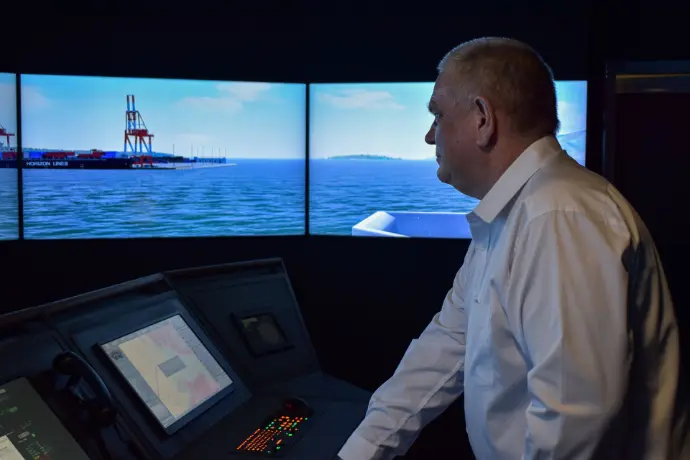
Yearly course-man-days conducted
Of courses available through blended learning
IGF professionals trained
Maritime courses
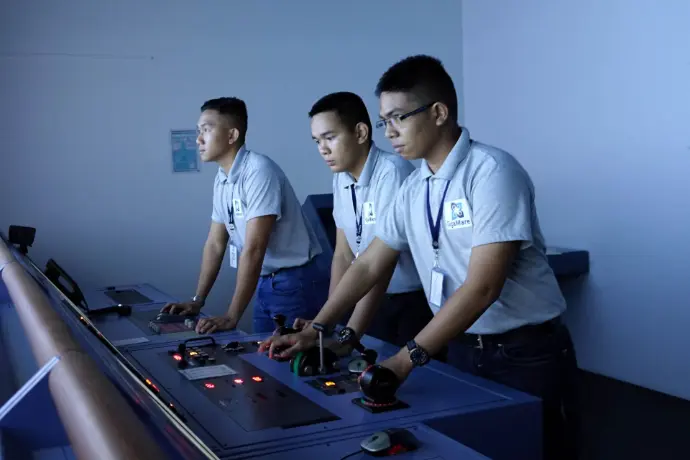
Cadet Programs
Full programs for the development of officers and engineers.
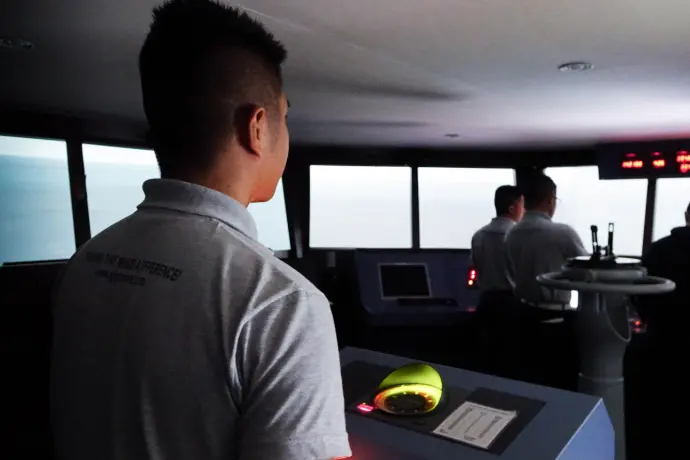
Deck and Navigation
Ship handling & navigation along with bridge management and simulation courses.
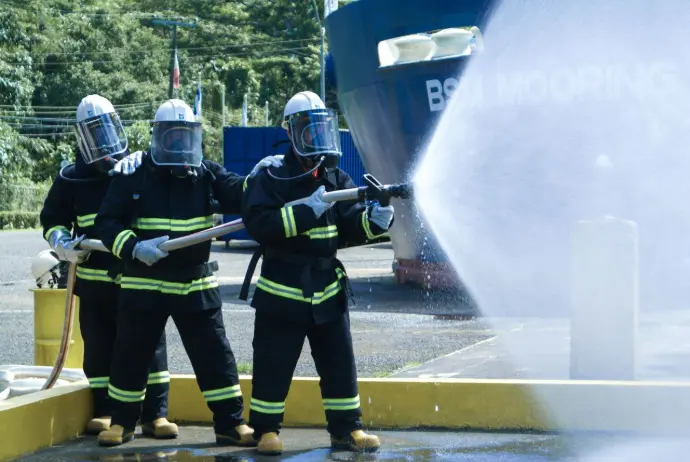
Environmental Efficiency
Fuel efficiency and energy optimization courses along with IGF and oil voyage performance.

Engineering
Wide array of engine operation and maintenance courses including 2 and 4-stroke engines, LNG and Shipfitter courses.
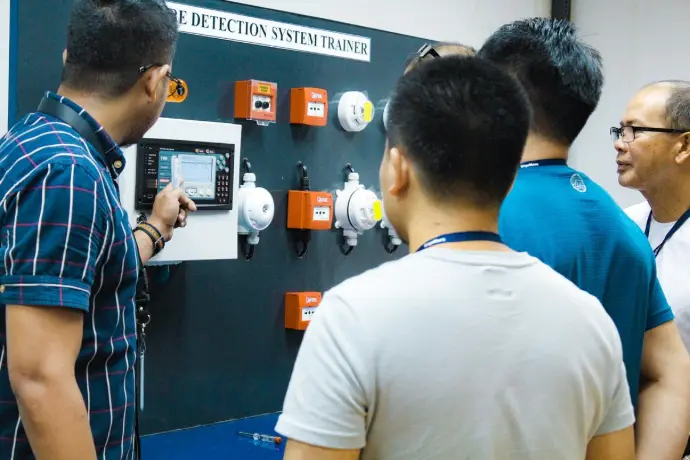
Electrical and Automation
Electrical system safety and maintenance courses.

Resource Management
Maritime resource management (MRM) and human element and leadership management (HELM)
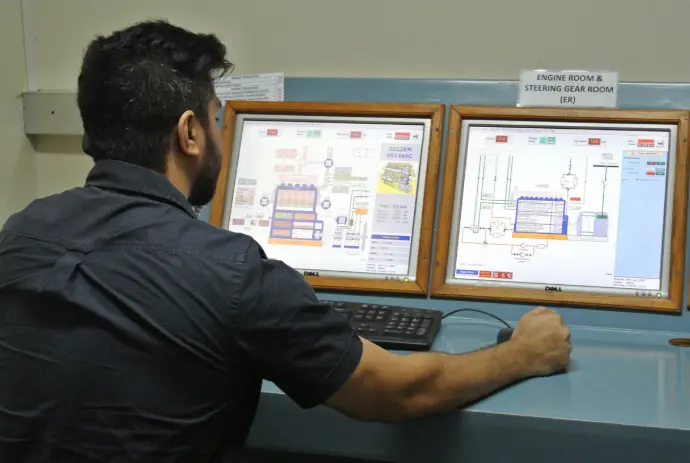
Tanker and Cargo Management
Gas measuring and liquid cargo handling courses and simulations.

Wärtsilä Products
Wärtsilä engine operations basic and advanced, engine RTA and RT-Flex basic and advanced courses.

Maritime Safety
Basic and Advanced safety training in partnership with IDESS Maritime Training Center.
All our courses
Cadet programs
Structured training program aimed for deck and engine cadets who have completed 3-year academic requirements. 16 weeks of training in our training facility in Subic Bay and 12 months of sea service onboard customer vessels required for licensure exam. Learn more.
Covers mandatory competences and proficiencies prescribed in the STCW code. Designed to enable trainees to meet and successfully demonstrate the competences required for Electro-Technical Officers. Learn more.
Covers the mandatory competences and the required knowledge, understanding and proficiencies prescribed in Section A-III/7, Table A-III/7 of the STCW Code. Learn more.
From assessment and selection process to the level of attaining their OIC license for Engineering Watch. In partnership with Aboa Mare. 16-week training program and 12-month sea service onboard customer vessels. Learn more.
Program includes marine electro technology, hydraulics and pneumatics, explosion protection and gas measuring courses. Learn more.
Deck and navigation
Bridge team management training including maritime resource management theory lessons and practical simulator training. Implementation of standardized bridge procedures and checklists with reference to the bridge procedures guide 2007. Specific company procedures used as requested. Learn more.
Course includes in-depth analys of ColReg, refresher in bridge procedures, attitudes to safe navigation and case studies at the bridge simulator. Learn more.
Courses available are Polar Code Basic, Polar Code Advanced and a combined course with both. Delivered in cooperation with Aboa Mare Maritime Training Center. Learn more.
Navigation, voyage planning, vessel positioning, use and setup of radar equipment, COLREG and watchkeeping. Learn more.
Course includes introduction to safe mooring operations, mooring and anchoring equipment, how to moor safely and prevent accidents as well as tools to improve safety culture. Learn more.
Ship handling training in severe wind and tide conditions, when under tugboat assistance, in narrow ports or in poor visibility. Learn more.
Basic ship handling course including squat, interaction and bank effects, propulsion systems and external forces on the ships. Ship handling in case of emergency. Learn more.
Ship handling under various conditions and more effective teamwork during ship maneuvering in normal and emergency situations. Learn more.
Theory and simulator excercises based on the ICS/OCIMF "ship to ship transfer guide (Petroleum) 4th edition". Learn more.
Training in critical situations such as malfunctioning equipment and man-over-board. Learn more.
Environmental efficiency
Understanding and prevention of corrosion. Identification, application and pre-treatment requirements of marine paint. Learn more.
Engine and engine system operation in order to achieve energy saving goals. Learn more.
Bridge practices to improve vessel fuel efficiency. Learn more.
Engine room practices to improve vessel fuel efficiency. Learn more.
IGF Code basic and advanced courses or a combined course providing both. Delivered in cooperation with Aboa Mare Maritime Training Center. Learn more.
Operate, analyze and troubleshoot alarms, dissect system layouts and console monitoring. Learn more.
Operation, preventative maintenance and troubleshooting of oily water separator units. Learn more.
Operation of oil discharge monitoring equipment, oily water separator and other related equipment. Maintaining records of activities in the oil record book. Learn more.
Identifying and preventing problems to improve voyage performance on crude oil tanker´s. Learn more.
Identifying and preventing problems to improve voyage performance on product tanker´s. Learn more.
Engineering
Familiarization with the main components of an electronic engine. Common rail and bus systems, operation of the control system and diagnosing common operational faults. Learn more.
Safe engine maintenance and maintenance planning, effective engine operation and basics of engine operation parameter evaluations. Learn more.
Evaluation, planning, safe operation and maintenance of 4-stroke dual fuel engines. Learn more.
Safe engine maintenance and maintenance planning, effective engine operation and basics of engine operation parameter evaluations. Learn more.
Engine maintenance procedures and best practices and post maintenance reporting using Solvang´s system. Learn more.
Operation, maintenance and troubleshooting of various auxiliaries in the ship and power plant engine room. Learn more.
Operation, maintenance and troubleshooting on cargo pumping systems. Learn more.
Mooring equipment maintenance, corrosion prevention excercises, theory and application of sampling and cargo measurements. Safety practices and methods of tank preparation. Learn more.
Common rail systems, bus systems and electrical diagrams. MOP and MPC practical operations. Learn more.
Precise measurements on liner clearances, setting up honing equipment, safe liner honing and proper reporting. Learn more.
Higher efficiency in engine operation and maintenance. Learn more.
Design features, operation conditions, performance and fault diagnostics of the governor installed on the engine. Learn more.
Fundamental concepts of hydraulics. Identification, analysis and construction of circuit diagrams. Learn more.
Steam properties and heating systems, boilers, main turbine and propulsion systems, LNG steam boiler plant operation and mandatory requirements. Learn more.
Operational procedures and parameters of main and auxiliary machinery. Learn more.
Basic theories of heat transfer, main components of refrigeration systems and cooling arrangements in provision rooms and cargo spaces. Learn more.
Operation, maintenance and troubleshooting of oil mist detector onboard ships. Learn more.
Crane operation and safety systems. Systematic and scientific troubleshooting for electro-hydraulic cranes including PLC operated cranes. Learn more.
Engine maintenance procedures. Familiarization with fundamental safety aspects, tools and equipment. Learn more.
Tailor-made training program from assessment and selection to certification. Learn more.
Electrical and automation
Safety requirements of shipboard electrical equipment. Operation, application, maintenance and troubleshooting of electrical equipment and instruments. Learn more.
Safety measures of electrical systems. Learn more.
Safe and efficient operations of marine power plant. Learn more.
Classification of hazardous zones, properties of gases, bonding and maintenance of ex-proof equipment. Learn more.
Theory and functionality of Salwico fire detection systems along with installation, operation, maintenance and troubleshooting. Learn more.
Theory and functionality of Salwico gas detection systems along with installation, operation, maintenance and troubleshooting. Learn more.
Instrument and process control fundamentals. Learn more.
Common electrical hazards and safety precautions. Preventative maintenance and repair of electrical equipment. Learn more.
Identification of early signs of motor failure and corresponding corrective actions and maintenance. Learn more.
Electrical systems and electrical manuals. Working principles of operating and maintaining electrical equipment. Learn more.
Principles of programmable logic controllers. Troubleshooting, fault finding and module programming. Learn more.
Resource management
Understanding of leadership and teamwork at the operational level onboard ships. Learn more.
Licensed by ALL Academy (Swedish club), alternating CBT modules with group discussions and simulator sessions. Learn more.
Tanker/cargo management
Responsibilities during loading, discharging and care in transit or handling of cargo on an oil tanker. Learn more.
Safe practices of gas measuring devices and awareness of safety hazards in tank entry procedures, enclosed spaces and other dangerous areas as defined by regulations and company SMS. Learn more.
Use of liquid cargo handling simulator on LNG cargo handling operations. Learn more.
Safety aspects in a tanker operation and effective support of LNG cargo handling operations. Learn more.
Use of the liquid cargo handling simulator for LPG cargo handling operations. Learn more.
Operational skills for chemical tanker operations using the liquid cargo handling simulator. Learn more.
Operational skills for oil tanker operations, carrying out procedures for handling oil products including loading, discharging, topping up, stripping and tank clearing using the LCHS. Learn more.
Wärtsilä products
Main components of WECS 2000, WECS specific functions, WECS documentation, safety systems and hands-on maintenance operations. Learn more.
Fundamentals of engine operations, operating value evaluation and maintenance planning. Learn more.
Engine design and function, maintenance schedules and fault-finding. Practical exercises and use of engine simulator. Learn more.
Essentials of engine operating value evaluation and maintenance planning. Learn more.
Safe and efficient maintenance of RTA engine. Learn more.
Differentiation of RT-flex engine from the conventional 2-stroke engine and familiarization with engine components, hydraulics, pneumatics and WECS 9500/9520 control systems. Learn more.
Efficiency in the flex control system in operator mode with pulse lubrication system, failure simulations and modifications on control hardware. Learn more.
IDESS safety training
Comprehensive knowledge and practical skills in advanced safety procedures and techniques for shipboard emergencies. Learn more.
Basic skills and knowledge to contribute to the safety of personnel onboard ships and to protect the marine environment. Learn more.